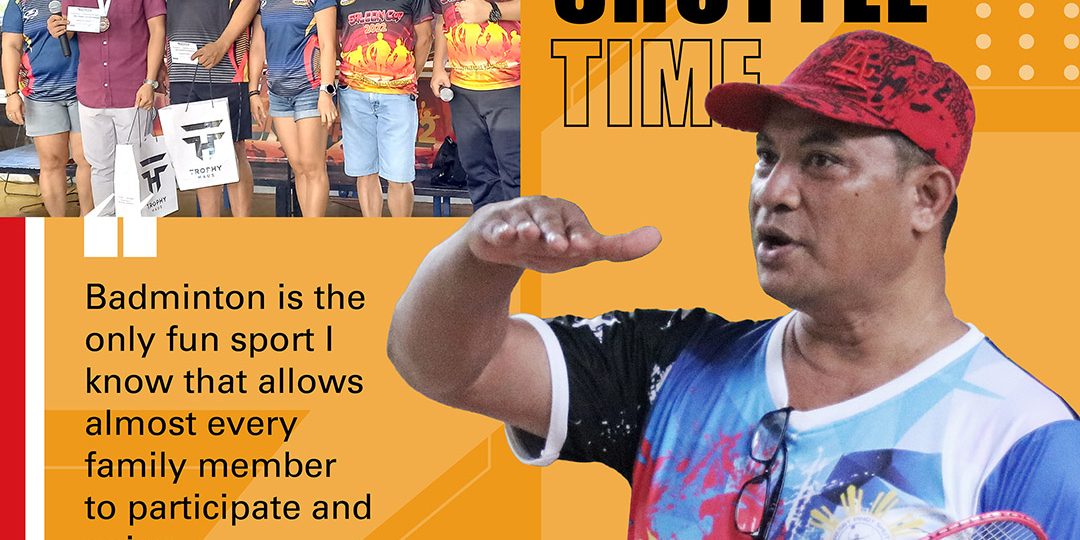The Humans of Shuttle Time series from the Badminton World Federation shares the viewpoints of those who contribute to grassroots badminton development. Kinivanagi Karo, shuttle time teacher from Papua New Guinea, shares his story of growing up in Papua New Guinea and what badminton means to him.
Growing-Up Years
I was born in a coastal village called Hula along the southern coast of Papua New Guinea. I come from a family of eleven and we knew nothing except daily chores and fishing with my dad. He taught us many valuable lessons in a very strong religious setting. I was raised in my village until I was 12 years old and moved onto high school for four years. After that I remained away from home to complete all my tertiary education and eventually became a school teacher. I didn’t play any organised sports except traditional games involving little equipment or none at all.
First Badminton Experience
I first saw badminton played in 1986 in Port Moresby at an assembly hall in an institute that I was accommodated in as a first-time public servant working for the Education department. Expatriate colleagues and a handful of nationals were playing social matches and I naturally became interested with this interesting racquet spot simply because I was playing social tennis then. Next thing I knew, I was already a regular player and became so good at it beating some of the experienced players. I preferred to play doubles because I couldn’t cover the whole court, and to this day I still cannot or because I have not tried. At my age now it might not be possible.
First Impressions
That it was much more easier using less court area to cover unlike tennis and squash to me was too strenuous. The racquet was lighter and so was the shuttle. I quickly grew a liking for the sport and have not looked back. Also badminton could be played by just about anyone including the whole family – that’s the cool thing about badminton, no one is left behind!
Relationship with badminton
I was excited when asked to coordinate badminton in Papua New Guinea and immediately set up a meeting to introduce the sport to schools by going to the PNG Sports Foundation and the National Capital District Education Office. I was given instant approval to introduce the sport and when the GymBad Program started, we expanded to the inclusive resource education centres. We even hooked up with the Special Olympics PNG Program and conducted a few Shuttle Time teacher training courses. I decided to register the federation with the backing of the Badminton Oceania Confederation. It was quite challenging going into schools that already had every other sport programme running and we were competing with them as you only have five school days in a week.
What Makes it Different
Badminton differs in many ways from the other sports and games. Badminton is the only fun sport I know that allows almost every family member to participate, even if they are only able to sit or stand in a place. It can be played sitting down, standing up or sitting on a wheelchair. It is not a complex sport to try out and requires minimal equipment. Badminton does not discriminate as anyone from a child, older person, anyone with any form of disability, women and youth can actually play without feeling intimidated.
Developing Badminton in the Community
People generally were sceptical about the sport because all their lives they have been used to playing largely ball sports. Developing badminton took time. Small children love the new sport and are always keen to play it on a daily basis. My own village community has a large group of small children who play the game. Introducing the sport to newer communities is taking time because their schedules are full with ball sports and other programmes. I believe that once they are educated about the benefits of joining a racket sport, they will make a change and that is slowly happening in many communities we introduce the sport in.
Impact of Shuttle Time
For the Para population and inclusive resource education centres, badminton has played a key role in changing the lives of individuals with various disabilities. Teachers of specially-abled children are glad the GymBad programme was introduced to them because they see the difference in the outlook of these children. They are more attentive in class and the smiles say it all. Secondly, Shuttle Time has allowed the younger children in communities to stop roaming the streets aimlessly; they are attracted to badminton sessions, especially in village settings. Thirdly, we are developing young leaders to be responsible citizens of our community and country.
Lesson From Shuttle Time
Start small when introducing a new sport for the first time. Grow the programme in your own community and let your community be the role model before reaching out to nearby communities. Starting with too many communities can affect your purpose and focus from the outset.






